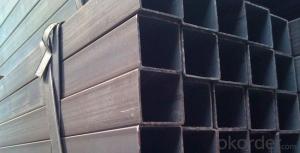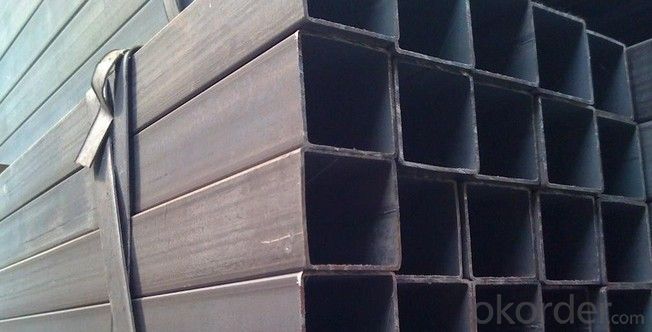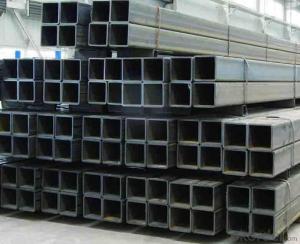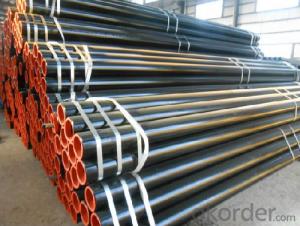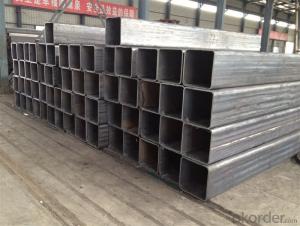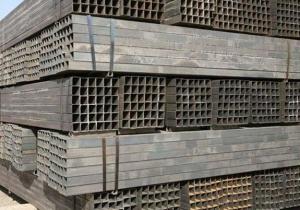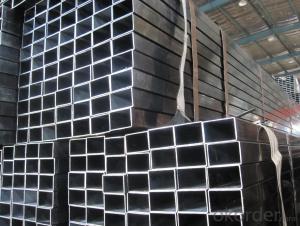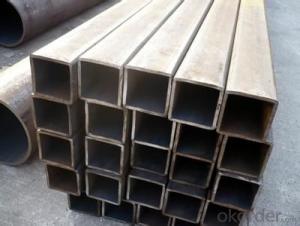ASTM A500/JIS/EN Rectangular hollow section pipe
- Loading Port:
- Tianjin
- Payment Terms:
- TT OR LC
- Min Order Qty:
- 10 m.t.
- Supply Capability:
- 5000 m.t./month
OKorder Service Pledge
OKorder Financial Service
You Might Also Like
Product Name | rectangular hollow section/ RHS | |
Size | Size: | 10*10--500*500mm |
Thickness: | 0.45--16mm | |
Length: | 3-12m | |
Steel Grade | Q195,Q215,Q235,Q345,16Mn, 20# | |
Standard | ASTM A500,EN10219,GB/T6728,GB/T6725,JIS G3466 | |
Usage | 1. For Structure, Airport, Railway 2. Construction and so on. | |
Ends | Plain end or By Your Choice | |
Surface | Bared Or With Oiled Or Galvanized | |
Technique | ERW ,Hot Rolled and Cold Rolled | |
Section Shape | Rectangular | |
Inspection | With Hydraulic Testing, Eddy Current , Infrared Test | |
Package | Bags, Bundle, In Bulk, Containers | |
MOQ | 20 Metric Ton / Can Be Negotiated | |
Supply Ability | 15,000 Metric Ton/Month | |
Date of Delivery | 7 days(Qty within 1000 Metric Ton) or According To The Quantity | |
Port of Shipment | Tianjin, China | |
Payment | L/C T/T | |
- Q: What's the difference between round and round tubes?
- Round steel is a medium solid steel, of course the tube is hollow
- Q: What is the difference between steel pipes and plastic pipes?
- The main difference between steel pipes and plastic pipes lies in their material composition. Steel pipes are made from a durable and strong metal alloy, while plastic pipes are composed of various types of plastic polymers. This difference in materials leads to variations in their properties and usage. Steel pipes are known for their high strength, resistance to extreme temperatures and pressures, and longevity, making them suitable for applications requiring robustness, such as in industrial settings or underground pipelines. On the other hand, plastic pipes are lightweight, flexible, and corrosion-resistant, making them ideal for plumbing, irrigation, and other non-industrial applications. Additionally, plastic pipes are easier to install and handle due to their lighter weight and flexibility compared to steel pipes.
- Q: What type of steel pipe for security windows?
- 25 parties, 70 parties in general! Good point of about 90; 25/38 general 90, a good point of about 120! The model is usually 202. If 304 is used, it is usually multiplied by 2! Plastic steel window material is hard plastic! Inside a single glass lined steel prices have 75/90/120/150/ different brand price this is the price of the window! Aluminum alloy is generally 100/120/150/175/190 area, different prices different
- Q: What is the meaning of "DN" and "Phi" in the dimensioning of steel pipe diameter and how to apply the mark?
- DN refers to the nominal diameter of the pipe, but this is neither the outside diameter nor the inside diameter, and the "Phi" means the outer diameter of the steel pipe. For example, the same nominal diameter of the steel pipe due to its different wall thickness, corresponding to the outer diameter is also different. As can be seen from the chart below:Project control table (commonly used) diameter pressure pipe standard pressure pipe standard pressure pipe standard specification DN- nominal diameter: diameter of large diameter series DN15- 22mm DN20- 27mm DN25- phi, Phi Phi Phi Phi 34mm, DN32- 42mm DN40- 48mm DN50- 60mm DN65-, Phi Phi 76 (73) mm, DN80- 89mm DN100- 114mm DN125- and Phi Phi Phi. 140mm DN150- 168mm DN200- 219mm DN250- phi, Phi Phi Phi Phi 273mm, DN300- 324mm DN350- 360mm DN400- 406mm DN450- 457mm DN500- and Phi Phi Phi Phi, 508mm DN600- 610mm, DN15- 18mm series of small diameter Phi Phi Phi, DN20- 25mm DN25- 32mm DN32- 38mm DN40- 45mm DN50- Phi Phi, Phi Phi Phi 57mm DN65- 73mm, DN80- 89mm DN100- 108mm, DN125- 133mm DN150- 159mm DN200- and Phi Phi Phi Phi, 219mm DN250- 273mm DN300- 325mm DN350- 377mm, Phi phi,
- Q: Which is better, galvanized steel pipe or stainless steel?
- In rural and urban areas, it is often necessary to wash them in order to keep them in the open. In the heavily polluted industrial and coastal areas, the surface can be very dirty and even rust. But to obtain the aesthetic effect of outdoor environment, it is necessary to use nickel stainless steel. Therefore, 304 stainless steel is widely used in curtain walls, side walls, roofs and other building applications, but in corrosive industrial or marine atmospheres, it is better to use 316 stainless steel. There are several design criteria including 304 and 316 stainless steel.
- Q: How are steel pipes used in the renewable energy sector?
- Steel pipes are widely used in the renewable energy sector for various applications. They are commonly used for the construction of wind turbine towers, providing structural support and stability. Steel pipes are also used in the construction of solar power plants, where they are utilized for the installation of solar panels, mounting structures, and support systems. Additionally, steel pipes are employed in geothermal energy projects, helping to extract and transfer hot water or steam from underground reservoirs. Overall, steel pipes play a crucial role in the renewable energy sector by facilitating the efficient generation and transmission of clean energy.
- Q: What are the limitations of using steel pipes?
- Some limitations of using steel pipes include their susceptibility to corrosion and rust, which can affect their durability and lifespan. Steel pipes are also relatively heavy and can be challenging to transport and install compared to lighter materials. Additionally, steel pipes may require more extensive maintenance and repairs due to their vulnerability to cracks and leaks.
- Q: Can steel pipes be used for wastewater treatment facilities?
- Yes, steel pipes can be used for wastewater treatment facilities. Steel pipes are commonly used in wastewater treatment plants due to their durability, strength, and resistance to corrosion. They can efficiently transport and distribute wastewater throughout the facility, ensuring its proper treatment and disposal. Additionally, steel pipes can withstand the harsh conditions and chemicals often present in wastewater treatment processes, making them a reliable choice for this application.
- Q: What are the main aspects of precision steel tubes?
- Products according to their application areas are divided into: automotive, precision machinery tubes; power plants, nuclear power tubes; titanium and titanium alloy tubes; chemical tubes; varieties include colored, black; seamless; welding; general and special-shaped
- Q: What is the thickness of steel pipes?
- The thickness of steel pipes varies depending on the specific application and type of pipe used. Typically, steel pipes are available in various thicknesses, measured by their schedule or wall thickness. Schedule 40 is the most common schedule for steel pipes, known for its standard wall thickness. However, for applications demanding higher strength or pressure resistance, thicker pipes with higher schedules like Schedule 80 or Schedule 160 are also available. Moreover, the thickness of steel pipes can be tailored to meet specific project requirements.
Send your message to us
ASTM A500/JIS/EN Rectangular hollow section pipe
- Loading Port:
- Tianjin
- Payment Terms:
- TT OR LC
- Min Order Qty:
- 10 m.t.
- Supply Capability:
- 5000 m.t./month
OKorder Service Pledge
OKorder Financial Service
Similar products
Hot products
Hot Searches
Related keywords
